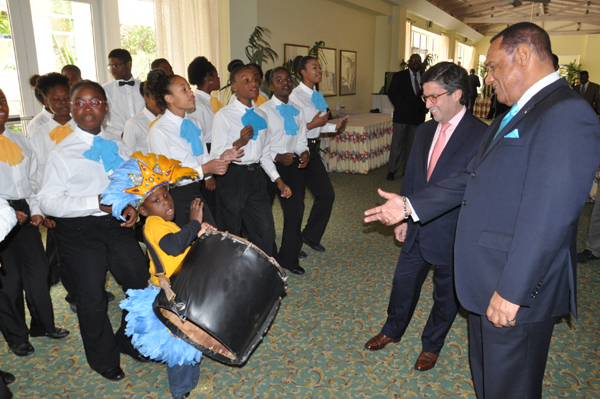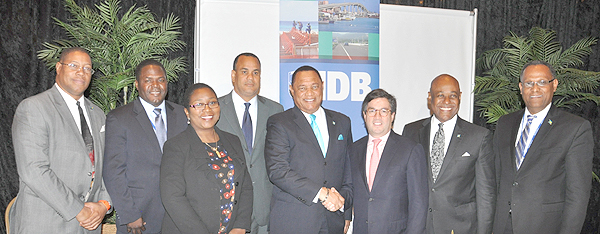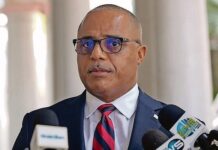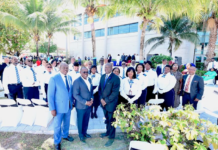Bahamas Gets $600,000 IDB Technical Cooperation Grant

By Robyn Adderley
Bahamas Information Services
FREEPORT, Grand Bahama – Prime Minister of The Bahamas, the Rt. Hon. Perry Christie, officially opened the 4th IDB Caribbean Governors Regional Meeting at Grand Lucayan on Thursday.
According to the Prime Minister, “The Bahamas, like the rest of the members in the Caribbean Constituency of the Bank, has come to appreciate the importance of these meetings. They allow us to caucus on the pressing matters within the Bank that affect our region. In particular, they afford us the opportunity to present the region’s positions to you, Mr. President, in advance of the Annual Meeting.”
The Prime Minister then commended the President of Inter-American Development Bank (IDB), Luis Moreno, for listening to the various points of view from the Caribbean annually.
He said, “Indeed you first convened these meetings, Mr. President, at the time when the Caribbean was coming to terms with the very fragile and tenuous recovery of the global economy from its most protracted economic and financial crisis since the Great Depression. It was a crisis that exposed many of our own structural frailties and raised to a critical level the multifaceted dependence we all have on the IDB, the CDB and other international financial institutions.
“Even as we continue to emerge from the Great Recession, the scars of what we have already had to endure are glaringly evident. But even as we reflect of the wounds we have suffered and from which we are still recovering, we are challenged to continue to adhere to sound policies and to follow sensible public sector investment strategies so that our growth prospects can be maximized.
“Healthy growth”, continued the Prime Minister, “speaks to reducing, in many cases, unacceptably high unemployment, a problem that is especially vexing among the youth of our respective jurisdictions.”
While representing CARICOM in China, said Prime Minister Christie, speaking with President Barak Obama in Washington, and then in Costa Rica, he raised the question and challenges that face the countries in this region on youth unemployment. In response to a speech made by President Obama, he said, “we ignore that to the extent that these young people become very vulnerable. We ignore them at our peril – we ignore their plight at our peril.”
The levels of violence seen in the Caribbean countries, continued the Prime Minister, leads to a conclusion that unless it is recognized that without an intervention that is meaningful and productive, the risk is run of having serious trouble in terms of its implications.
“Healthy growth also speaks to the imperative of addressing our major social maladies, chief among them crime and poverty.
“Most solutions point to the need for a more prominent role for the private sector in developing and sustaining the engines of economic growth. In this regard, we anticipate that the reform of the IDB’s private sector lending framework will also result in increased financing for a broader range of economic growth-producing enterprises within the Caribbean.”
Turning his attention to debt and vulnerability, the Prime Minister said “although the pace is uneven, our regional outlook is beginning to improve, premised in many instances on strengthening tourism demand and in other cases on healthy export that position us to take optimal advantage of the recovery trends in the global economy.”
“I am aware that the Bank is re-examining its lending framework to ensure that it remains responsive to the increased demand for development financing within the context of fiscal consolidation imperatives that limit the capacity of the major industrial countries to fund development lending in the less developed world.
“Technical and financial support from international financial institutions and development agencies, including the Inter-American Development Bank (IDB) and the Caribbean Development Bank, cannot be understated as they continue to undergird the pivotal reforms to our own policy frameworks directed on a regional and country-by-country basis.”
He said the IDB should be mindful of the role it plays technically and financially, in supporting the countries in the region. “When we must borrow, the ease of access to such funding must not be unduly or unreasonably inhibited. The tendency to categorize our respective countries as middle or high income must be discounted against our very fragile existence, especially having regard to our narrow economic bases, our high structural costs and our increasing vulnerability to climate change and natural disasters.”
The Prime Minister said he knows the President understands the problems faced in the region, and hopes they are not side lined, but put on the front burner for improvements.
The IDB also contributes to countries that are not present at the meeting.
“First, as a region, we continue to welcome the interventions that are being made in Haiti. An economically prosperous and stable Haiti would augur well for all countries in this region, and particularly so for The Bahamas which, as you know, bears a disproportionately large share of the cost stemming from the outward migration from Haiti to the North.”
Addressing matters of Tourism, “it is my fervent hope that the reform of the private sector lending arm of the IDB will also bear fruit for the region. High public sector debt in itself is compelling us to accelerate the emphasis on private sector driven growth and to explore how to structure fiscally prudent public-private partnerships with a view to addressing more of the infrastructure gaps which, in turn, would lead to stronger private sector growth.
“While I commend the Bank for its visibility in the region, its presence in the private sector needs to increase, and it needs to be especially registered in making the Tourism sector more diversified and resilient. As the primary engine for growth for most of our economies, we must find new ways of increasing and broadening local ownership in the sector, and to promote more eco-based developments.”
Prime Minister Christie then applauded President Moreno for existing initiatives that could contribute to a national Integrated Coastal Zone Management (ICZM) policy framework; help build the foundational capacity for development and implementing an investment programme in ICZM; and provide designs and feasibility analyses for the investment programme for consideration for financing. (source: IDB TC Abstract).
“The entire Bahamas – all of the land mass – can be considered as coastal areas. Therefore, the works to be undertaken are crucial for the long term development of the country:
• An assessment of the various alternative development scenarios for Andros; and
• The development of a proposal for a viable physical development plan that optimizes the economic value of Andros’ natural capital.”
He continued, “The Bahamas has commenced on a comprehensive modernization of its Integrated Coastal Zone Management (ICZM) system to assist in the long run planning of the country. The specific objectives of this programme are to develop a project which accomplishes the following:
• The measurement of the economic value of Andros’ ecosystem services, inclusive of its coastal and marine ecosystems, pine forests, mangroves, sea grass beds and tidal creeks;
• The development of realistic development scenarios taking into consideration the well-being of Androsians and the entire Bahamas.”
In his capacity as Chairman of CARICOM, the Prime Minister said he spoke at the Caribbean Energy Summit Meeting about three weeks ago in Washington, DC. The meeting focused on energy challenges and solutions for the Caribbean. “Solar, wind, wave, geo-thermal and other forms of renewable energy are increasingly viable, cost-effective alternatives to fossil-fuel based energy reliance. Indeed the historical reliance on imported fossil fuels puts a significant strain on our growth and entrenches our own contribution to the greenhouse emissions and global warming to which the region is so extremely vulnerable. Notwithstanding the current reduced prices of fuel on the world market, we cannot assume that this condition is permanent. Mr. President: I do believe that with the IDB’s assistance, the drive to reduce the reliance on fossil fuels can be achieved.
“As this gathering is regional in its composition and focus, I beg your indulgence to highlight our own energy reform initiative in relation to the major provider of electricity in the Bahamas, the state-owned Bahamas Electricity Corporation (BEC). I am pleased to report that we are poised for a significant regime shift that will not only introduce private players to the production of electricity but expand the range of inputs to energy with a view to driving down costs for businesses and home consumers alike.”
Also in attendance were: Minister of Tourism, the Hon. Obie Wilchcombe; Minister for Grand Bahama the Hon. Dr. Michael Darville; Minister of State for Finance, the Hon. Michael Halkitis; and other senior government officials.
The 56th meeting of the Inter-American Development Bank will be held in Nassau in April, 2016.








